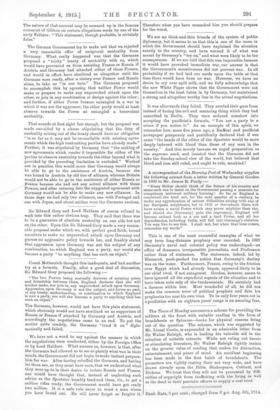That sounds at first sight fair 'enough, but the proposal
was made one-sided by a clause stipulating that the duty of neutrality arising out of the treaty should have no obligation "in so far as it may not be reconcilable with existing agree- ments which the high contracting parties have already made." Further, it was stipulated by Germany that "the making of new agreements which render it impossible for either of the parties to observe neutrality towards the other beyond what is provided by the preceding limitation is excluded." Worked out in practice, this would mean that Germany would always be able to go to the assistance of Austria, because she was bound, to Austria by old ties of alliance, whereas Britain would not be able to go to the assistance of either Russia or France because she had not any actual alliance with those Powers, and after entering into the suggested agreement with Germany would not be able to make any new alliances. In those days we bad only two alliances, one with Portugal and one with Japan, and about neither were the Germans anxious.


































 Previous page
Previous page